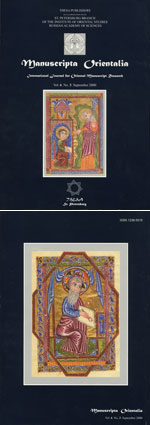|
|
| |

|

|
Polosin Val. The Arabic Bible: Turning Again to an Old Controversy // Manuscripta Orientalia. Vol. 6. No. 3. September 2000. P. 3—18.
Once, on one of the “folios” of his memoirs which were first published in Russian in 1945, Academician I. Krachkovsky (1883—1951), not without a note of humor, wrote about what a problem the progress of national schools of Arabic studies creates:
“The young Arabist who wishes to penetrate deeply into his subject has to tread a difficult and sometimes devious path. To begin with he must master various instruments de travail, and perhaps in the first place the languages of Western Europe. As science progresses the number of necessary foreign languages steadily increases. Already the seventeenth century saw the end of the period when a scholar could carry on with Latin alone. To-day he realises from the outset that in order to utilise the fundamental and indispensable hand-books he must be familiar not only with English, French and German but also with kalian, because since the second half of the nineteenth century works in this language on Arabic subjects have taken their place in the forefront of learned literature. The connection of Spain with the Arab world becomes clear to the Arabist from any handbook on mediaeval history, but now he learns that an important school has been created since the end of the nineteenth century by an energetic pleiad of Spanish Arabists whose work in many cases cannot be ignored. If he wishes to devote himself to a special branch of Islamic studies he will soon learn that the best course on Muslim law, as well as a series of fundamental works on the internal history of Islam, have been published in Dutch. The important and original schools of Danish and Swedish Arabists will compel him to acquaint himself with the Scandinavian languages, and he should regard it as a happy accident that the greatest authority on Islam of the past generation, who was a Hungarian, published his works in German, and that Finnish scholars often write in Swedish and other more accessible languages. But this is not all. It would be sinful for a Russian Arabist to ignore works on his subject written in the Slavonic languages: he must in the first place study the centuries old Czech tradition and the new Polish school which has energetically developed its Oriental studies since the first World War in a whole series of editions and periodicals. He should know that in Serbian, besides an important literature on the development of Arab letters in Bosnia and Herzegovina, there have appeared within the last decades many works on general Arab subjects. In some cases he will find Bulgarian useful. In Ukrainian the Arabist will find lively sketches of the contemporary Muslim world and perhaps the best works of fiction on Syria by a distinguished scholar [1]. The list of necessary languages grows longer and longer. Were one to face this phalanx all at once, it might seem overwhelming, but in the steady course of a lifetime one often masters it without noticing.
An Arabist can understand the simulated horror of the famous Dutch Orientalist Snouck Hurgronje who once visited Mecca incognito, as expressed in his letter to Rosen written from Batavia in Sumatra in the eighteen-nineties. In this letter he thanked Rosen with a slight touch of irony for sending him the latest number of the Zapiski Vostochnago Otdeleniya Imperatorskago Russkago Archeologicheskago Obshchestva which were published only in Russian, adding that soon a young Orientalist might find himself obliged, before he could devote himself to his particular subject, to learn thirty—two languages in which various works connected with his speciality were published, including besides Russian and Dutch even Tamil and Malayan... Fortunately in practice this is not as terrifying as it sounds, for the importance of different languages in the field of Arabic studies varies and not all of them are equally necessary for particular subjects”.
Despite the length of this quote, 1 very much wanted to cite it in its entirety. For a departure from the injunction it contains was at one time the cause of a notable scholarly event; the work I present below is a distant echo of that event…
К содержанию выпуска...
 PDF-файлы PDF-файлы
Полный текст статьи
Ключевые слова
Библия арабская
коллекция ИВР РАН: факсимиле
Крачковский, Игнатий Юлианович
рукописи арабские
фонд арабографичный
|
|
|
|
Случайная новость: Объявления |
|
22 марта 2023 г. в ИВР РАН состоится Четырнадцатая научно-практическая конференция отделов Центральной и Южной Азии и Дальнего Востока ИВР РАН «Путешествия на Восток-2022». Предлагаем вашему вниманию программу. |
|
Подробнее...
|
|
|
|
|

